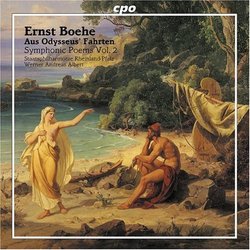| All Artists: Ernst Boehe, Ari Rasilainen, Werner Andreas Albert, Rheinland-Pfalz Staatsphilharmonie Title: Ernst Boehe: Aus Odysseus' Fahrten, Symphonic Poems Vol. 2 Members Wishing: 0 Total Copies: 0 Label: Cpo Records Release Date: 4/19/2005 Genre: Classical Style: Symphonies Number of Discs: 1 SwapaCD Credits: 1 UPC: 761203990825 |
Search - Ernst Boehe, Ari Rasilainen, Werner Andreas Albert :: Ernst Boehe: Aus Odysseus' Fahrten, Symphonic Poems Vol. 2
 | Ernst Boehe, Ari Rasilainen, Werner Andreas Albert Ernst Boehe: Aus Odysseus' Fahrten, Symphonic Poems Vol. 2 Genre: Classical |
Larger Image |
CD Details |
CD ReviewsEverything but Memorable Melody J Scott Morrison | Middlebury VT, USA | 04/29/2005 (2 out of 5 stars) "The case of Ernst Boehe (1880-1938; sometimes spelled Böhe) is like that of any number of musicians who started out to be composers but are ultimately remembered primarily for their work as conductors (one thinks of Weingartner and Furtwängler). In this case, the orchestra playing Boehe's music is the one that he essentially founded just after World War I, the one now-called the State Philharmonic of the Rhineland-Palatinate (Staatsphilharmonie Rheinland-Pfalz) based in Ludwigshafen am Rhein. The music contained herein was all written in his twenties, and indeed he did not write much of anything after he took up conducting full-time. Here we have three tone poems, each more than twenty minutes long, each in the style of Richard Strauss, a kind of hyperchromatic, contrapuntal, richly orchestrated music intended to convey emotional states as well as points in a narrative. There is occasional full-brass bluster reminiscent of Bruckner. And there are occasionally interesting moments, but not enough to rescue these overblown concoctions. First is the fourth section of a tetralogy called 'Aus Odysseus' Fahrten' ('From Ulysses' Voyages') called 'Odysseus' Heimkehr' ('Ulysses' Return Home'). It is a 29 minute description of the travails of Ulysses as he tries to return from his adventures to his faithful wife Penelope. Musically it is characterized by a paucity of memorable melodies that nonetheless are put through the harmonic grinder, with incessant modulation clothed in inventive orchestration. It all adds up to very little although the thrust of the music would have us believe that this is Important Stuff. Much the same can be said for the other two works included here: 'Taormina,' a tone poem commemorating Boehe's vacation in Sicily, and 'Symphonisch Epilog zur einer Tragödie' ('Symphonic Epilog to a Tragedy'). Both are occasionally soured by some uncertain brass intonation. One wants so much for this music to be more than it is, but the truth is that for all Boehe's skill as a manipulator of musical materials, he doesn't really have anything that important to say even though he keeps repeating it more loudly. It's probably just as well that he spent the majority of his adult life as a well-respected conductor in his native southern Germany. The performances here by Werner Andreas Albert and the Rheinland-Pfalz Philharmonic are all one could expect. And the sound is full, rich and lifelike. And in spite of my cavils about this music, my hat is off to cpo for bringing us bits and pieces of late romantic music from Germany; otherwise we would not have had their marvelous releases of music by Emil von Reznicek from them ('Der Sieger' and 'Schlemihl'). Scott Morrison" Interesting Late German Romantic Kenneth Gilman | Miami Fla | 11/07/2006 (4 out of 5 stars) "This music is much better & more enjoyable than the other review would lead you to think. Please see my review of the Vol. 1 of Boehe's tone poems." More Bountiful and Bounding Boehe.... Neal Schultz | Orange County, CA | 08/24/2008 (4 out of 5 stars) "As I indicated on my review of the CPO's highly enjoyable vol.1 of Boehe's works...I am no more a shill for the second-tier composers for the sake of dethroning our composer royalty than I would be a musical grumposaurus who demands that all of his music must always be in the Classical Music Top 500.
Boehe is, to be sure, part of that burgeoning second-tier of composers that labels like CPO have done an outstanding job of unearthing much to my delight. Not because Boehe is a hand-me-down composer of [R.] Strauss's or Zemlinsky crowd that I make allusions to their style but only as a reference to the listener who, like me, wants to know whom an unknown composer's music is comparable to. Now this is BIG music here. Not the retiring sort of laid-back music we might program for a quiet dinner party. Uhhhh.....no. I must agree with Mr. Morrison's point that we really want "...so much for this music to be more than it is." However, I do not agree with the rest of his review that this music is wind that blows everywhere and goes nowhere. Indeed it does to my ears. My sense is that this music will mean the MOST to you if you are not a newcomer to classical music; and that your ears have already been "schooled" in the breadth and scope of complex late romantic music. If so, then Boehe should be a hidden gem for you. The playing of the Staatsphilharmonie Rheinland-Pfalz under Maestro Albert and CPO's sonics are reliably first-rate even when dealing with the congestion in some of the louder parts of these compositions. The first time I heard these two CDs (see my review of Vol. 1 of Boehe as well) I ranked them in my Windows Media Player a strong 3 and 4 stars. After repeated hearing I have bumped up their scores. Surely a mark of music that continues to reward the listener over time. 4 stars -- strongly recommended." |
